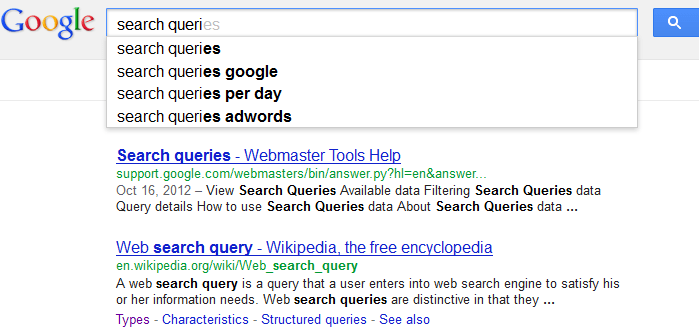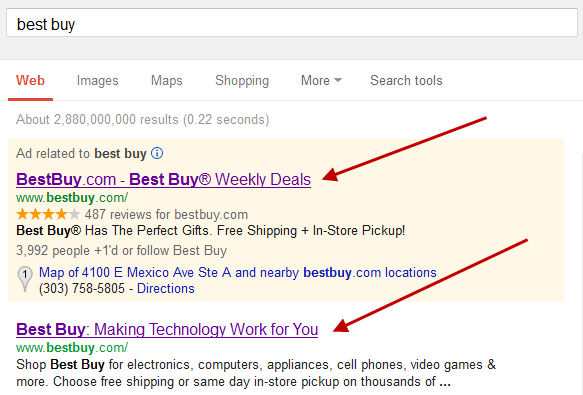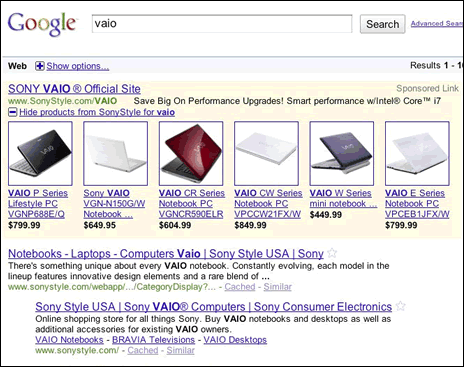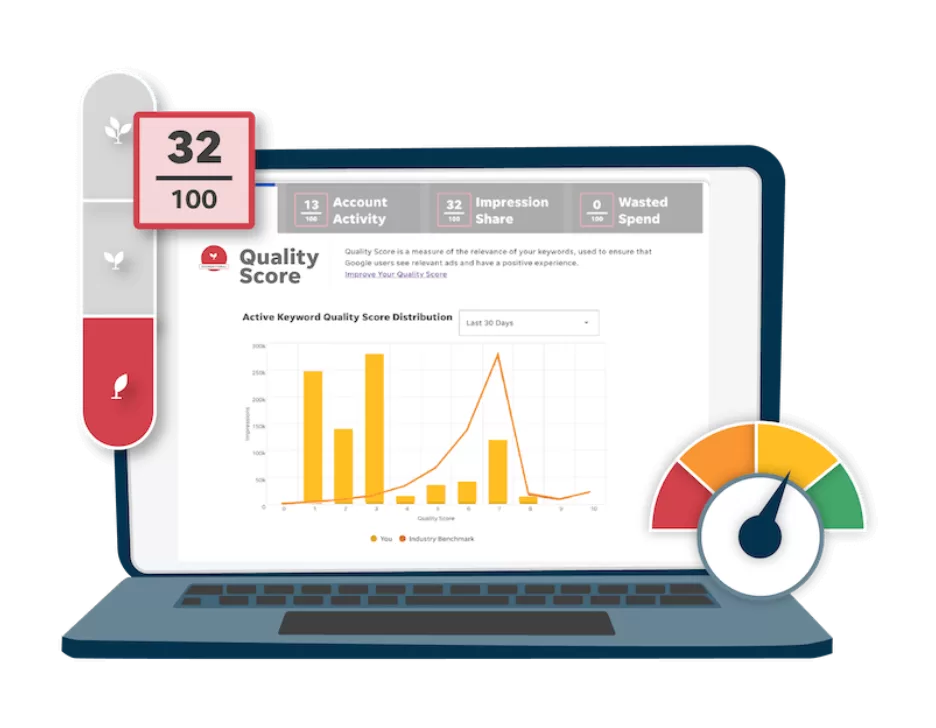Search queries – the words and phrases that people type into a search box in order to pull up a list of results – come in different flavors. It is commonly accepted that there are three different types of search queries:
In the search marketing world, we tend to talk more about keywords than search queries (news flash: they’re not quite the same thing). But today we’re talking search queries. Let’s go into a little more detail on what these three types of search queries are and how you can target them with your site content.

Navigational Search Queries
What Is a Navigational Search Query?
A navigational query is a search query entered with the intent of finding a particular website or webpage. For example, a user might enter “youtube” into Google’s search bar to find the YouTube site rather than entering the URL into a browser’s navigation bar or using a bookmark. In fact, “facebook” and “youtube” are the top two searches on Google, and these are both navigational queries.
How Should You Target Navigational Search Queries?
The fact is, you don’t stand much of a chance targeting a navigational query unless you happen to own the site that the person is looking for. True navigational queries have very clear intent – the user has an exact site in mind and if you’re not that site, you’re not relevant to their needs. Google, which classifies this type of query as a “go query” according to some reports, has even taken the step of reducing the total number of results on the first page to 7 for navigational brand queries, leading to a 5.5% reduction in overall organic first-page listings. However, some queries that appear to be navigational in nature might not be. For example, someone who googles “facebook” might actually be looking for news or information about the company.
Tip: Make sure you own your own brand’s navigational query. Ideally, your site will appear in both the top organic spot and as the top sponsored result in a search for your brand or company name. As Brad Geddes has pointed out, “in many cases, it is worth buying keywords even if you rank organically for them,” because your total profits will end up higher. Branded keywords tend to drive both clicks and conversions.

Informational Search Queries
What Is an Informational Search Query?
Wikipedia defines informational search queries as “Queries that cover a broad topic (e.g., colorado or trucks) for which there may be thousands of relevant results.” When someone enters an informational search query into Google or another search engine, they’re looking for information – hence the name. They are probably not looking for a specific site, as in a navigational query, and they are not looking to make a commercial transaction. They just want to answer a question or learn how to do something.
Run our free Google Ads Performance Grader today and you’ll find out which keywords are burning your budget!
How Should You Target Informational Search Queries?
Informational queries are hard to monetize. Google knows this, which is why it’s been pushing the Knowledge Graph to address these types of queries. The best way to target informational searches is with high-quality SEO content that genuinely provides helpful information relevant to the query. Wikipedia, for all its flaws, is pretty good at providing basic, reliable-enough info on an extremely broad range of topics, which is why they rank on the first page for about half of all searches (well, that and their enormously powerful link profile).
Wikipedia leaves a lot to be desired for a lot of informational searches, though. That’s where you come in! Here are some of the ways you could target informational queries to drive traffic and leads to your site through organic search:
- Write a blog post full of tips that would be useful for your prospective customers – if you’re a PR consultant, for example, you could write a blog post on how to create a press release.
- Create a how-to video that is relevant to your business (like this home improvement dude who made a video on how to build a tree house).
- Write a detailed, step-by-step guide that elucidates a process relevant to your business (for example, take SEOmoz’s great beginner’s guide to SEO).
- Design an infographic that illustrates a concept (like our infographic on how the Google Ads auction works).
There are many ways to approach informational content. Get creative. The goal is to position yourself as a trustworthy, authoritative source of information, not to try to cram your products down the searcher’s throat. This is the time to build awareness of your brand. If you can answer a searcher’s question, they’ll be more likely to think of you positively in the future if they need the kind of offerings you provide.
If you’re looking for more direction when it comes to content marketing, check out these related posts:
- Aligning Keyword & Content Types with Business Goals
- How to Rank for a Keyword in 10 Steps
- A Beginner’s Guide to Content Strategy for the Web: 10 Things You Need to Know
Transactional Search Queries
What Is a Transactional Search Query?
A transactional search query is a query that indicates an intent to complete a transaction, such as making a purchase. Transactional search queries may include exact brand and product names (like “samsung galaxy s3”) or be generic (like “iced coffee maker”) or actually include terms like “buy,” “purchase,” or “order.” In all of these examples, you can infer that the searcher is considering making a purchase in the near future, if they’re not already pulling out their credit card. In other words, they’re at the business end of the conversion funnel. Many local searches (such as “Denver wine shop”) are transactional as well.

Vertical searches are a subset of transactional search queries, and they represent people looking to make a transaction in a specific industry. These include local searches, restaurant searches, hotel searches, flight searches, etc. Google’s moves in recent years to directly target vertical searches have led to accusations of antitrust violations.
How Should You Target Transactional Search Queries?
We recommend a two-pronged approach here. There is no reason not to target transactional queries with organic content, like optimized product pages and local SEO strategies, but you should consider using PPC to target these search terms as well. Here’s why:
- These are exactly the kinds of queries that are mostly likely to deliver ROI in paid search. If people are looking for a specific type of product to buy, a sponsored ad is just as likely as an organic result to deliver what they need.
- Sponsored results take up a lot of the available space on the SERP for commercial/transactional queries. If you want visibility above the fold for transactional keywords, you should consider PPC.
- Google offers lots of bells and whistles for sponsored ads and product listings. For example, you can include a picture of your product. Your options in organic results are more limited and less controllable.
- In one study, we found that people click on paid results over organic results 2 to 1 for queries with high commercial intent. This is probably because sponsored results take up so much of the above-the-fold real estate on these types of searches, because the new ad formats are so eye-catchingly clickable, and because lots of search engine users can’t tell the difference between ads and non-ads. (NB: Commercial search queries are just a small percentage of total search query volume overall, so organic results still take the lion’s share of overall clicks. More on that here.)
These are some of the reasons we recommend using AdWords for transactional search queries. It’s a scalable and cost-effective way to drives leads and sales. However, know that if you want to drive more overall traffic, your best bet is to build out your SEO content as well, since there are more informational queries than transactional ones.
Any questions about these search query types and what they mean for search marketers? Let us know in the comments!








